The Plextor M3 (256GB) Review
by Kristian Vättö on April 5, 2012 3:05 AM ESTRandom and Sequential Read/Write Speed
The four corners of SSD performance are as follows: random read, random write, sequential read and sequential write speed. Random accesses are generally small in size, while sequential accesses tend to be larger and thus we have the four Iometer tests we use in all of our reviews. Our first test writes 4KB in a completely random pattern over an 8GB space of the drive to simulate the sort of random access that you'd see on an OS drive (even this is more stressful than a normal desktop user would see). We perform three concurrent IOs and run the test for 3 minutes. The results reported are in average MB/s over the entire time. We use both standard pseudo randomly generated data for each write as well as fully random data to show you both the maximum and minimum performance offered by SandForce based drives in these tests. The average performance of SF drives will likely be somewhere in between the two values for each drive you see in the graphs. For an understanding of why this matters, read our original SandForce article.
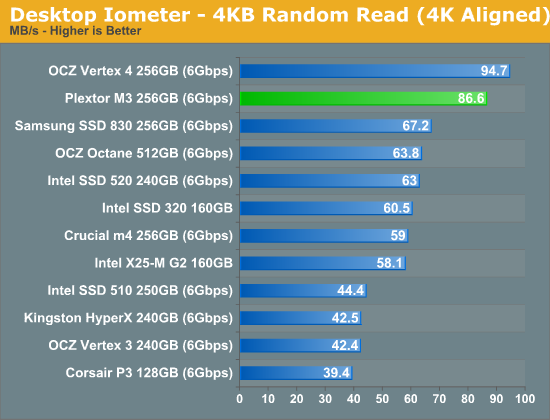
Plextor M3 provides very good 4KB random read performance. Looking at the Crucial m4 that uses the same Marvell controller, the Plextor M3 is 47% faster in random performance, so Plextor has clearly paid attention to their firmware.
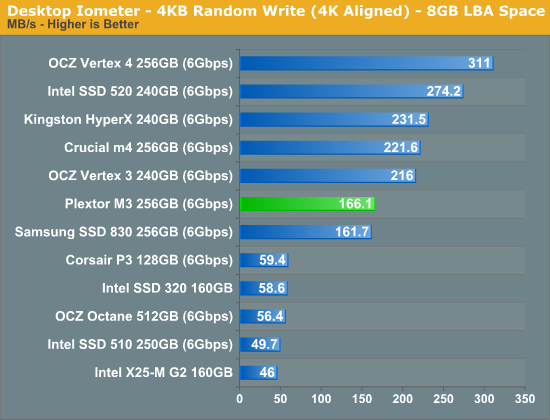
Random write performance is not as great as random read but still quite good enough for most workloads. This time Crucial's m4 comes out 33% faster than the M3, while the SF-2281 drives are all faster as well—write less data thanks to realtime compression and data deduplication techniques and your write speeds should generally be faster.
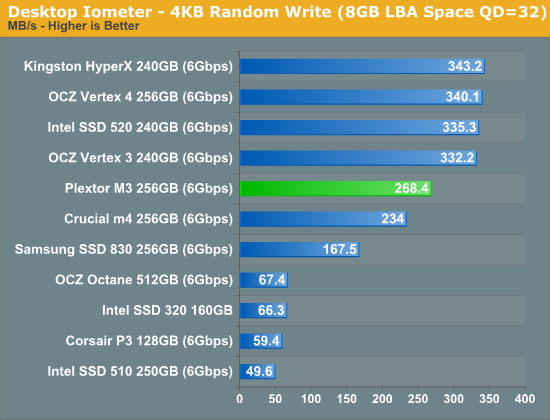
Switching the queue depth to 32 shows the difference between SandForce and non-SandForce quite well. SandForce is in its own class but among the Marvell SSDs, the Plextor M3 is the fastest. It's important to note that only heavy I/O workloads use queue depths that reach 32; most usage models don't go over 5.
Sequential Read/Write Speed
To measure sequential performance we ran a one minute long 128KB sequential test over the entire span of the drive at a queue depth of 1. The results reported are in average MB/s over the entire test length.
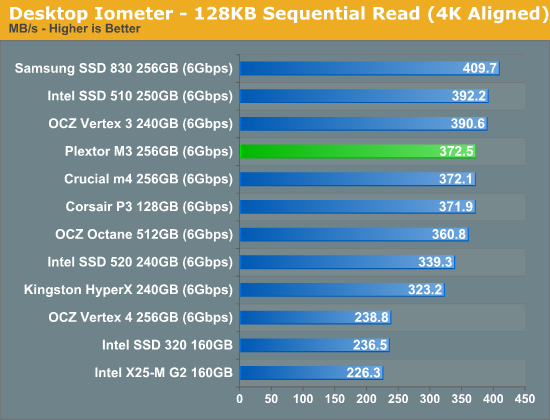
Sequential read speed is identical to Crucial m4 and Corsair P3, and good if not class leading for a SATA 6Gbps SSD.
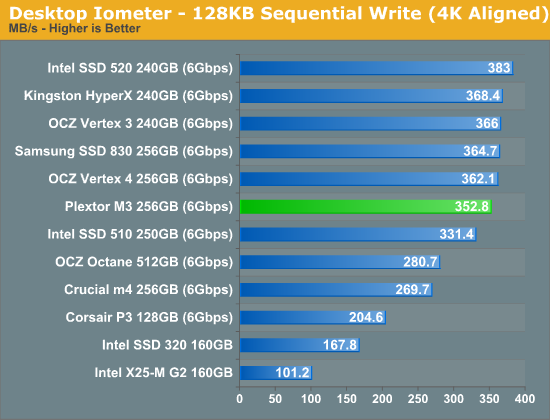
In sequential write speeds, the M3 is once again the fastest Marvell based SSD and is only a few percent behind SandForce based SSDs.










113 Comments
View All Comments
Tor-ErikL - Thursday, April 5, 2012 - link
In europe plextor is one of the pioneers in the IT industry. They where one of the first to enter the cd-burner market way back in the days. They are generally known in europe to produce some of the finest quality products when in comes to cd-burners and back in the days it was the only burner to own ;)Tor-ErikL - Thursday, April 5, 2012 - link
I'm not surprised that they come up with another good quality product here, they have always been more expensive than others but you always get a good quality product from them.Fujikoma - Thursday, April 5, 2012 - link
The last Plextor optical drive I had broke within months. It was very flimsy and the shipping to have it fixed was more than buying a replacment from another vendor that had the same build quality. Plextor's quality isn't any different than other cheap drive manufacturers even though their price is.Maiyr - Thursday, April 5, 2012 - link
I am still using a PleXCombo 20/10/40-12A. My experience in no way mirrors yours. I got this thing and another drive in 2002/2003 and both are still going strong. No problems.Maiyr
hansmuff - Thursday, April 5, 2012 - link
Those were different times.I have two plextor drives:
SCSI UltraPlex 40MAX, the best CD reader ever built.
ATAPI 8/4/32 CD burner. Also a really excellent drive.
Those were "expensive" back then. The ultraplex was $140, the 8/4/32 was ~$90.
After those, drive prices tumbled and Plextor used cheapo OEM drives like everyone else and rebadged them.
Both you and Fukikoma are correct.
vol7ron - Thursday, April 5, 2012 - link
Was going to say something similar.It's like how Seagate has had good drives, but they do have bad batches, especially as they're refining their process.
Quality should not be solely determined on the product. How a company responds to a defective, or poorly made product should extend into the definition of quality. It might not be product quality, but quality of the experience is more important.
Like, I might get a bad part off Newegg, but they have great customer service that make it easy to ship it back and receive a replacement or a refund. I know they're only a middle man in the process, but the tradeoff is having a good product with good customer service, that reduces customer hassle.
Sabresiberian - Saturday, April 7, 2012 - link
The thing that makes me wonder what's going on with your post is the way you describe Plextor's quality as not being better than "any other cheap drive". The fact is, there are near a dozen DVD burner brands that cost less than $25 that are reliable pieces of hardware. They are inexpensive, but they aren't cheap.I'm another person with a Plextor drive that's been around for a couple of builds, and will soon go in a third. Do I think it will outlast my LG drive I bought a couple of years later? No, but Plextor help set reliability and top-notch performance standards that are the reasons we have inexpensive and reliable burners now.
;)
andylawcc - Thursday, April 5, 2012 - link
ditto: Plextor made one of the best CD-Burner back then (talking only about, just late 1990).note to Mr. Vatto: you could have skipped that the line, we wouldn't know. ;p
JarredWalton - Thursday, April 5, 2012 - link
Note to our readers: Kristian is 17. When optical drives mattered (in terms of benchmarks), he would have been about 10.Kristian Vättö - Thursday, April 5, 2012 - link
I'm 18 now and have been for a few months ;-)